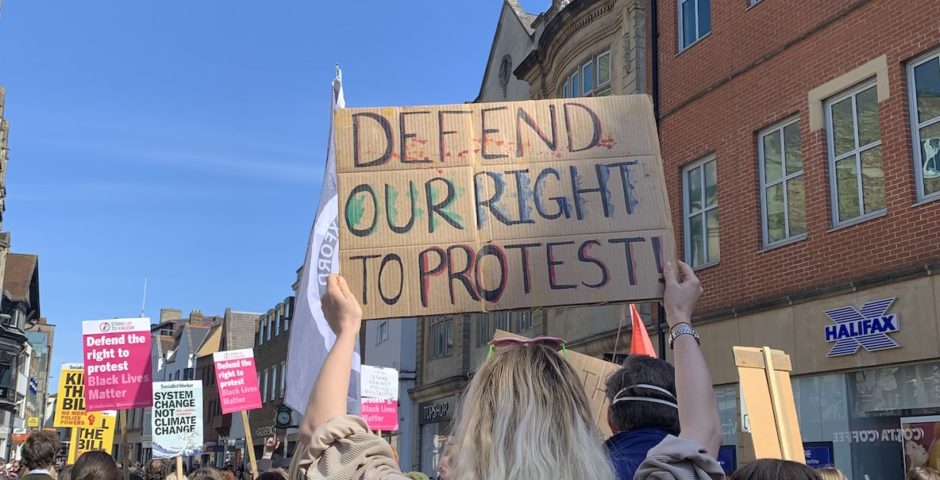
Second Kill the Bill protest takes place in Oxford
This was one of many across the country
On Saturday 17th April people in Oxford came together for the 2nd time to protest against the Police, Crime, Sentencing and Courts Bill currently being debated by MPs. Their primary grievance includes changes to protest laws that this bill would bring.
The protesters gathered at Bonn Square at 2pm and stood there for over an hour before marching through the city centre towards the Thames Valley police station. They were seen chanting slogans like “Kill the bill” and “No justice, no peace, abolish the police”. They held signs condemning fascism, racism, and political figures such as Priti Patel while supporting the right to protest. Speeches were also delivered by local organisers and community leaders.
Rita Kimijima-Dennemeyer, a finalist at St Hughs, told The Tab Oxford, “I went because limiting citizens’ ability to protest brings a government closer to totalitarianism which I think we can all agree isn’t a good thing. As somebody who identifies as being part of several marginalised groups, I also know that such limitations will affect people like me before they affect others, and I wanted to be there to defend my own communities, as well as to stand in solidarity with other groups like travellers who are going to be disproportionately affected by the bill.”
Second year Wadham student Alexander Orlov-Holmes further added, “I went to the protest because I think anyone who has been to a protest or even ever been opposed to a law is obligated to, if we don’t voice our opposition to the bill and try to stop it going through now we have no right to complain later when it is inevitably used against us. Considering the political climate of the last few years, it’s entirely obvious who the bill is targeting – environmental activists, BLM supporters, people who support antifa, people who the government would class as ‘woke’.
“With that in mind I see the bill as a sign of the UK government’s fear of these movements, and their admission that if they allow people to organise outside of the political system they have a risk of losing. The bill is a reaction to the organised, grassroots opposition that has sprung up against the government and capitalism over the last few years and I think because of that it’s important to keep pushing and not give up now at their very first (and definitely not last) attempt to shut down dissent.”

Image: Dhea Bengardi
Oriel fresher Riya Banerjee, also noted, “Protesting is such an important way to be politically active and make our voices heard especially when elections and voting are so infrequent/don’t always seem to do much. Especially for people who can’t vote because of age or other factors, it’s literally their only voice.
“And that just can’t be shut down no matter what, even if we’re in the scary situation where we’re literally having to protest to keep our right to protest. There were some really impactful voices at the protest and they really just offered way more perspectives on just how messed up the bill is.”
The event, spearheaded by Oxford Anti-Fascists, was co-hosted by 19 other groups around Oxford, including Black Lives Matter, Extinction Rebellion (XR), Oxford Youth Strike and Oxford Marxists. They all “oppose the Policing, Crime, Sentencing and Courts bill, which criminalises the right to protest and other basic rights and will be used selectively against marginalised groups such as travellers and people of colour. [They also] deplore the police violence against protesters in Bristol and will stand up to defend [their] right to protest.”
A spokesperson for Oxford Stand Up To Racism told The Tab Oxford, “This is a huge bill, both in length and in potential consequences – for people calling for social change facing greater criminalisation by the state, for Gypsy and Traveller communities facing threats to their way of life, and for anyone who values freedom of expression and the right to make themselves heard against the powerful. The changes to sentencing and police powers will deepen existing racial inequalities, sweeping more black, Asian and minority ethnic people into the criminal justice system for increasing periods of their lives.
“Protest is a central feature of a healthy democracy, and key developments in modern civil rights arose from protests. This Bill represents an attack on some of the most fundamental rights of trades unionists and of citizens, in particular those from marginalised communities. We the undersigned are opposed to this Bill and we will campaign and protest for its complete withdrawal.”
Featured Image: Anvee Bhutani









































